
Cover story: Can Ronnie Screwvala do a UTV with upGrad?
Build, scale, repeat: Ronnie Screwvala, who transformed UTV from a production company to a multimedia conglomerate, is now dipping into his entrepreneurial genius to build ed-tech startup upGrad into a venture of scale and impact
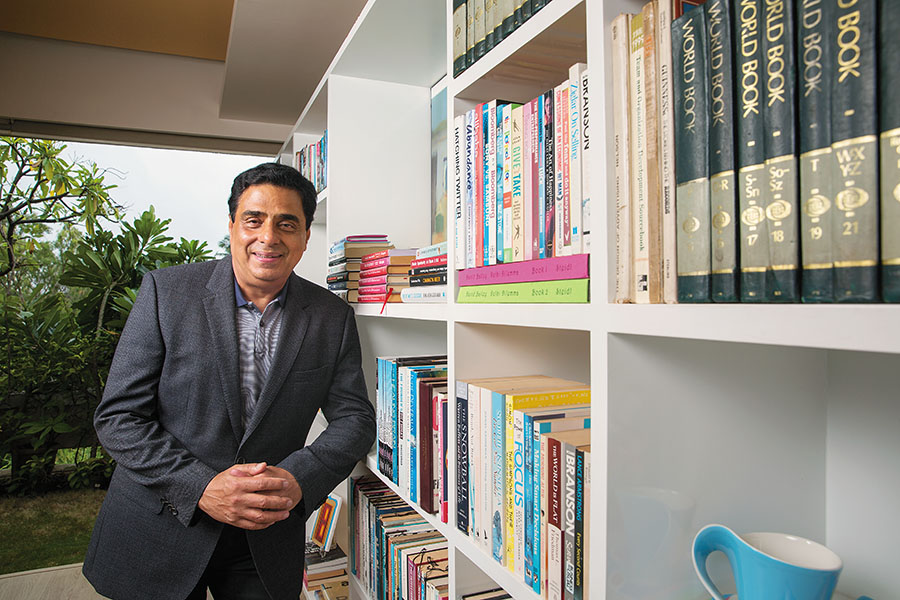 Ronnie Screwvala
Ronnie ScrewvalaImage: Mexy Xavier
I prime myself for a debate. After all, what better sobriquet to describe a man who has pioneered a slew of businesses since the 1980s—cable TV ‘Network’ in 1981, a toothbrush manufacturing unit, Lazer Brushes, which went on to become the largest in the country, media and entertainment company UTV, which would eventually be sold to global giant Walt Disney. Right now, Screwvala is the founder of a bouquet of companies, which includes edtech venture upGrad, PE firm Unilazer Ventures, film production house RSVP Movies, sports business U Sports, and not-for-profit Swades Foundation. I surely had an easy debate to win, right? Maybe not.
“A serial entrepreneur is one who builds or buys something with a clear intent to sell it in time. I have never started any business with an intent to exit, ever,” says Screwvala. “Serial by definition means pre-meditated and it goes against my core motto for entrepreneurship: Staying the course to create maximum value. It took me 20-plus years to build UTV and I never planned in my second year that I will sell it off 18 years on. Of the 2,000 to 3,000 people who emerged from the media, I probably stuck to it longer than most.”
Instead, what drives Screwvala, a first-generation entrepreneur, every time he builds a venture from ground up is scale and value. Consider that he started UTV as a TV production company in 1990 with all of ₹37,500. By the time he divested his stake in 2012 (about 23 percent at the time), it had an enterprise value of $1.4 billion and had grown into a conglomerate that, at various points along the journey, housed broadcast channels, a movie division, an animation studio and a games vertical, among others.
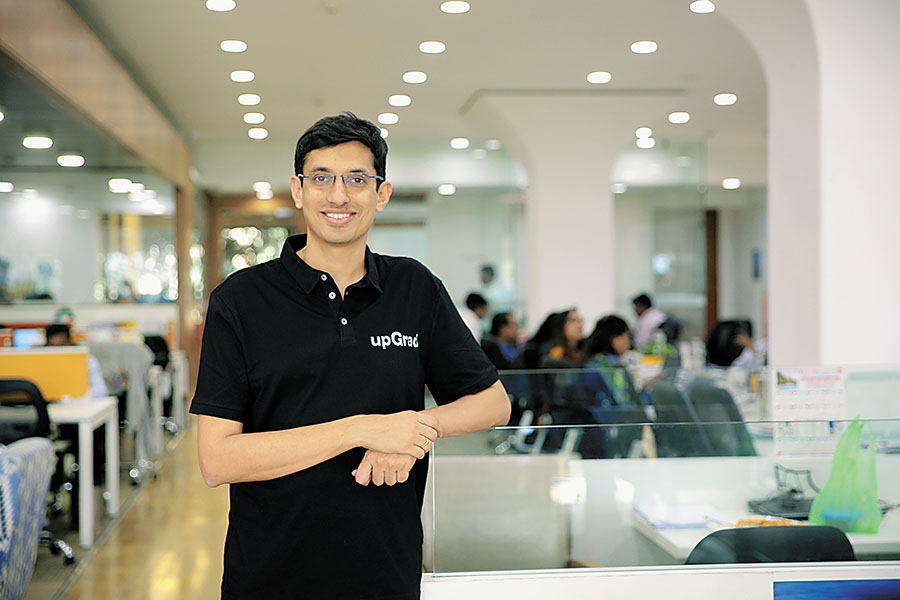 In 2015, Mayank Kumar joined Ronnie Screwvala to launch upGrad
In 2015, Mayank Kumar joined Ronnie Screwvala to launch upGradImage: Courtesy UpGrad
The itch to build and the hunger for impact stayed on even after Screwvala stepped down from UTV, and it took him just a 10-day vacation to New Zealand, his longest break that decade, to figure that out. To what next, he had a simple answer: More of the same; start all over and build from scratch. In the not-for-profit sector, it meant scaling up Share, a creche and an orphanage on the premises of the UTV office since 1990, into the Swades Foundation (along with wife Zarina) and committing an annual outlay of ₹100 crore for rural initiatives, while, on the entrepreneurial front, he considered three options—consumer goods, healthtech and edtech.
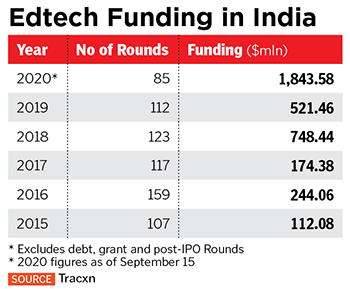
As he tested the waters, Screwvala connected with Mayank Kumar, then a vice president at Bertelsmann, a European media, services and education company. “During our first meeting at his office in Mumbai we exchanged notes on the sector,” says Kumar. There was radio silence from both ends for a few months before Screwvala pinged Kumar again. “He asked if I would be open to taking the entrepreneurial plunge with him. My first answer was no, as I had just moved to Delhi and had a baby. But, on second thoughts, there’s never a good time so to say, and the idea of starting something was always at the back of my mind.”
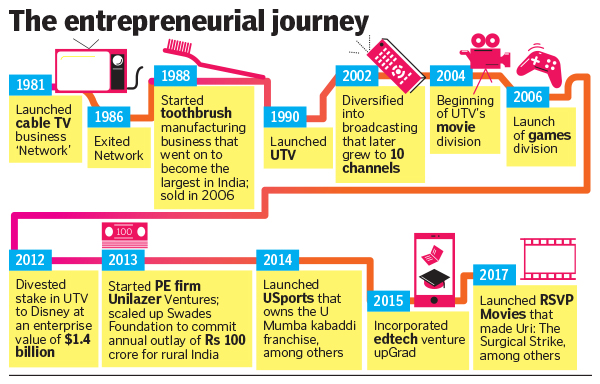
By the time upGrad was incorporated, Screwvala had already set up Unilazer Ventures, and U Sports, the owner of kabaddi franchise U Mumba. But he hands out my second strike when I call upGrad an addition to his business portfolio (which in 2017 also came to include RSVP Movies). “It’s not,” he says. “A portfolio for me is something like a LensKart where I have invested through Unilazer, and U Sports and RSVP are my passion projects. UpGrad is to me now what UTV was in my first innings. I am looking at it as an entrepreneur, a founder, with a full hands-on role as executive chairman. If I do not achieve at least 10-15x in scale, impact and value creation in half the number of years than what I did in media and entertainment, it will be a personal disappointment.”
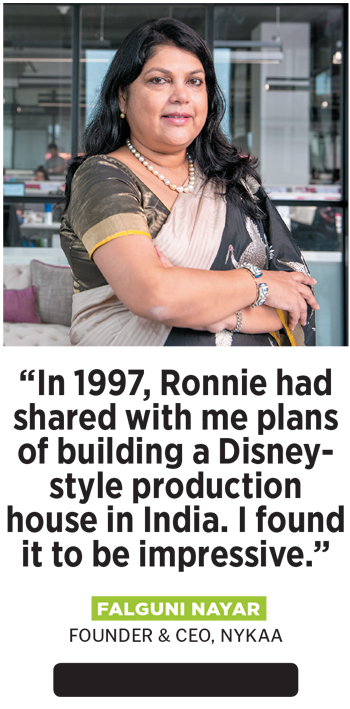 His years in the media and the entertainment industry have given Screwvala a feel of the pulse that helps in putting across brand messages in a lucid and cogent manner. First-time director Aditya Dhar and Sonia Kanwar, creative producer at RSVP, had approached Screwvala rather diffidently with the script of Uri: The Surgical Strike and their choice of Vicky Kaushal as the lead. But Screwvala, quick to identify that the storyline will resonate with viewers, vetted the movie in five minutes. Uri, made with a budget of about ₹25 crore, returned with over ₹244 crore in India and a rich haul of National Awards. In edtech too, Screwvala brought this understanding of the audience, with a keen eye on scale, helping upGrad tone down its initial “hoity-toity” communication line to reach a larger consumer base.
His years in the media and the entertainment industry have given Screwvala a feel of the pulse that helps in putting across brand messages in a lucid and cogent manner. First-time director Aditya Dhar and Sonia Kanwar, creative producer at RSVP, had approached Screwvala rather diffidently with the script of Uri: The Surgical Strike and their choice of Vicky Kaushal as the lead. But Screwvala, quick to identify that the storyline will resonate with viewers, vetted the movie in five minutes. Uri, made with a budget of about ₹25 crore, returned with over ₹244 crore in India and a rich haul of National Awards. In edtech too, Screwvala brought this understanding of the audience, with a keen eye on scale, helping upGrad tone down its initial “hoity-toity” communication line to reach a larger consumer base. Kumar leans on Screwvala for strategic and scaling guidance as well. Every time he’s put a number to a target, Kumar says, “Ronnie just ups, ups and ups it.” And with his strong bias for action, Screwvala ensures the targets are met. “During the early days, we would discuss an idea for 10 to 15 days and then Ronnie would just get us to push it out. Agar kuch hai toh karo [if there’s anything to be done, let’s do it] is his motto.”
“The impetus to start something would always be Ronnie’s. His head would bubble with ideas. He would take a piece of paper to bed and wake up in the middle of the night scribbling them down,” says Deven Khote, a co-founder at UTV and five years Screwvala’s junior at Cathedral & John Connon School in Mumbai. “What made UTV work was an entrepreneurial model where a new business would be set up, people would be brought in to run it and the minute it gained traction, Ronnie would be on to his next business idea.”
***** Despite growing up at a time when entrepreneurship was not as fashionable or respected as it is now, and didn’t have the semblance of an ecosystem, Screwvala knew this was what he wanted to do: “While studying BCom at Mumbai’s Sydenham College, it became clear I wasn’t ready to work for someone else, nor could I build on someone else’s vision. Today, everyone has a great vision and wants to be an entrepreneur. For me, the idea followed the spirit.”
The entrepreneurial zeal manifested playfully at 10 with earning a quick buck while organising plays with neighbourhood kids at Grant Road, where he lived, and later selling tickets to his family’s balcony that overlooked a theatre where superstars would come for film promotions; it soon grew into organising rock concerts during his teens, and going bankrupt. But his uncanny ability to identify trends and penchant for scaling came good when he launched Network, a cable TV business, at 25. In the first year, Screwvala gave over 1,000 demos and 3,000 door-to-door visits before he managed to set up his first connection. Soon, he changed his strategy to approach hotel chains that would give him thousands of paying rooms at one go, deployed dual pricing to fit varying family budgets and also approached airlines to play content on board. The business tripled in a year.
 Falguni Nayar, founder and CEO of Nykaa, recalls meeting Screwvala for the first time in 1997, when she was working in New York, and being rather taken with his grand vision. “He had shared with me his plans of building a Disney-style production house and studio in India, which I had found to be very impressive,” she says of the founder she looks up to. Nayar, who herself took the plunge with Nykaa—a retail seller of beauty, fashion and wellness products—often turns to the entrepreneurial values she has imbibed from him. “Believing in your vision, building relationships and building a business for the future.”
Falguni Nayar, founder and CEO of Nykaa, recalls meeting Screwvala for the first time in 1997, when she was working in New York, and being rather taken with his grand vision. “He had shared with me his plans of building a Disney-style production house and studio in India, which I had found to be very impressive,” she says of the founder she looks up to. Nayar, who herself took the plunge with Nykaa—a retail seller of beauty, fashion and wellness products—often turns to the entrepreneurial values she has imbibed from him. “Believing in your vision, building relationships and building a business for the future.”The unyielding pursuit of scale has been resonant in upGrad as its revenues have grown over 10x in three years, from ₹20 crore in FY17 to ₹230 crore in FY20. The edtech company is looking to close FY21 at a run rate of ₹1,200 crore, and is also expecting to turn operationally profitable. Screwvala believes it’s a fitting answer to naysayers who had said the average price of ₹2.5 lakh per 11-month deep learning course when it started would remain a niche business in India. “₹1,200 crore isn’t niche. Also, education loses credibility if it’s discounted. It’s not a food delivery or hail-a-cab business.”
 A still from Uri: The Surgical Strike that earned ₹244 crore in India
A still from Uri: The Surgical Strike that earned ₹244 crore in IndiaScrewvala is confident of sustaining the uptick over the long term through the upskilling space he operates in. That employability is an Achilles Heel is underlined by the 2019 Global Competitiveness Report, a databank on economic prosperity published by the World Economic Forum, that ranks India 107th among 141 countries in workforce skills. With greater premium on upskilling, it remains a market to be tapped. Unlike in K-12 where online education essentially supplements the school curriculum, upGrad aims to create a greater impact by handholding a learner from age 18 to 48, helping them move the needle throughout their career. “We need to be a lifelong partner for every learner and working professional from the age of 18-48 and in a way that every 3-5 years they would come back to learn or specialise more,” says Screwvala.
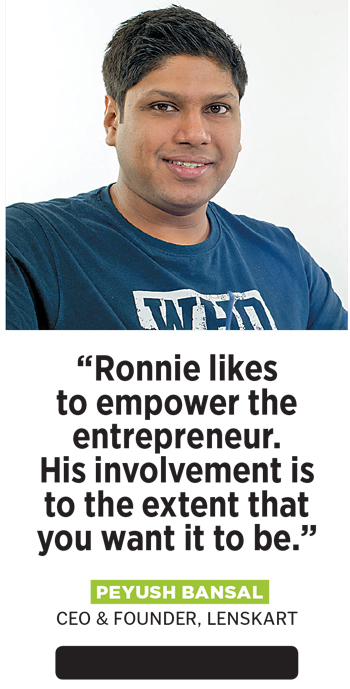
“Our parents retired from their first jobs, but now everyone changes jobs every few years. So the concept of one degree that worked historically will not work now,” says Kumar, co-founder and managing director. “Second, when we started off, there were 150 million people in the 18 to 24 age group. About 35 to 40 million were going to colleges. In India, access to education is low; if enrolments in higher education have to grow, online will have to play the role that cellphones did for the telecom industry.”
The principal levers of expansion for upGrad have come through a tie-up with over 100 colleges and universities since April, once Covid-19 hit, and launching monthly batches for 90-odd courses instead of every three to four months earlier. Besides, the Budget 2020 announcement allowing the top 100 educational institutions in the National Institutional Ranking Framework (NIRF) to offer full-fledged degree programmes online has brought in much-needed credibility and enabled it to roll out its first-ever blended degree programme, an LLM, from OP Jindal Global University in Haryana.
“We liked that upGrad had a vision of connecting with the professionals and was in a position to ensure that we had the academic freedom and institutional autonomy to determine all aspects of the curriculum, the programme, the faculty and the delivery of the programme,” says C Rajkumar, vice chancellor, OP Jindal Global University.
*****
While Screwvala’s growth plans for upGrad are wired for the next decade or two, there’s no denying the pandemic has catalysed online education as a sector by bringing it acceptability, and elevating it from being a flaky cousin of classroom learning. Besides, with its current climate of job uncertainties and massive layoffs—data by the Centre for Monitoring Indian Economy (CMIE) reveals that 18.9 million salaried people lost their jobs since April, of them 5 million in July alone—the pandemic has brought a sense of urgency among new adopters. Vardhan Surendra Kale, a Hyderabad-based engineer with Oracle for 15 years, left his profession to take up full-time photography last November. Till April, it brought Kale earnings higher than his previous salary. Then Covid struck. Kale has now joined a product management certification programme by Duke University, USA, hoping to switch to a career divorced from his previous two.
The sharp spike in edtech funding over the last several months stands testimony to soaring investor confidence. According to data from Tracxn, as of September 15, $1,843 million had been poured into edtech companies in India, as opposed to $474 million last year. While India’s first edtech unicorn Byju’s is said to have raised around $1 billion this year, Unacademy has made an entry into the unicorn club as well after raising $150 million in a round led by SoftBank early in September.
But Screwvala has refused to jump on the bandwagon. In fact, in its nearly five-year journey, upGrad hasn’t taken on any external funding and is powering with the ₹120 crore invested by him. That growth hasn’t slowed has given Screwvala clarity. “You tend to slow down for your day-to-day because you are going after funding. The minute your new investor comes in, your vision gets diluted because somebody else is on the table. And then, you are on a treadmill, in a rush to raise funds every six months, nine months, one year. Your business becomes about quarters rather than building for the future,” says Screwvala. “We’re happy now to go out and raise some funding, but we are not in the race for a decacorn status.”
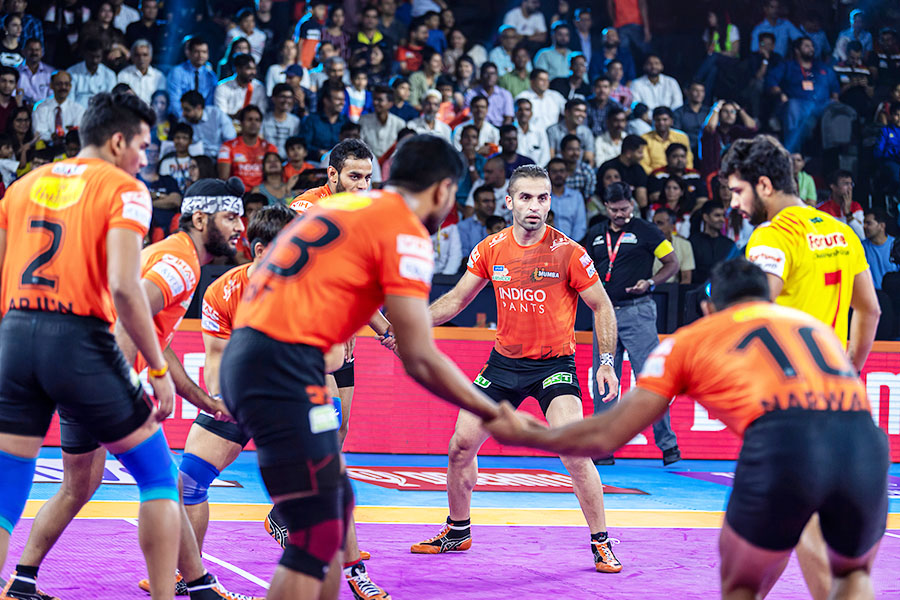 Kabaddi team U Mumba at a game during season 7 of the Professional Kabaddi League
Kabaddi team U Mumba at a game during season 7 of the Professional Kabaddi League Image: Courtesy USports The philosophy of building from the core and the quest for impact is something Screwvala practises as well when he sits across the fence as an investor with his private equity firm Unilazer Ventures, which he started with an initial portfolio investment of ₹300 crore; its net value today stands at over ₹ 1,650 crore and includes companies like LensKart, Niki.Ai, Kimaye (Ini Farms).
“Ronnie is an investor who likes to empower the entrepreneur. He lets me conduct board meetings the way I want to. His involvement is to the extent that you want it to be,” says Peyush Bansal, CEO and founder of LensKart. “But when you want him involved, he’ll be the first one to jump in. If you send Ronnie an email, he won’t ever miss it.”
Bansal recalls Screwvala once insisted he move to a new, single-floor office instead of the multiple-level space they were operating from. It was a time LensKart was low on cash and Bansal wasn’t keen initially. “Only when I moved I realised the power and the energy that collaboration and working in close proximity could bring.” It is on Screwvala’s advice too that Bansal shut down three verticals in his business—WatchKart, BagKart and JewelKart—and focussed on building LensKart, where the true value proposition and his heart lay.
Early in September, Screwvala turned 64, but he isn’t planning to slow down. “You have someone standing for the US president at 78,” he says. He displayed his hunger for challenge around 2014-15 when he picked up the U Mumba franchise in the Professional Kabaddi League, after being prodded on by a dinner conversation between his wife Zarina and industrialist Anand Mahindra, the brain behind the league. U Sports has now expanded to table tennis, football, volleyball and gaming. “He’s there every time we’ve turned to him. If I ask him to turn up for one morning session with the boys, he’ll turn up for a couple. He’ll be there for every strategy meeting you ask him to be there,” says Supratik Sen, co-founder and CEO.
Be it passion or profession, building scale and impact are values Screwvala won’t budge from.
(This story appears in the 09 October, 2020 issue of Forbes India. To visit our Archives, click here.)
Post Your Comment



_280x210_150x113.jpg)














